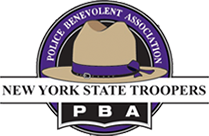PBA members explain the role of Troopers through Letters to the Editor
PBA, 2003-06-06
A PBA delegate who represents Troopers in the western part of New York state and a Trooper have written letters to the editor that were published in The Buffalo News. The letters addressed a comment, printed in that newspaper, that was made by a police manager with the Buffalo Police Department regarding his perception of the duties of Troopers.
The following are the text of the letters as printed in the newspaper:
Troopers serve the state’s communities
6/6/2003
I would like to commend Buffalo PBA President Bob Meegan for finalizing the police contract and ensuring fair pay for his officers now and in the future. This contract ratification, as reported in the May 24 edition of The News, makes the Buffalo police officers the highest paid municipal officers in the county and is certainly well deserved.
I was deeply disturbed, however, by the ignorant comments made by the unnamed police manager at the very end of the article. I do not know why this police manager chose to disparage hardworking and courageous New York State troopers. The comments basically stated, quite incorrectly, that New York State troopers only patrol highways issuing traffic tickets and that this type of work apparently is not dangerous.
First of all, New York State troopers do a lot more than highway patrol work. We perform a complete range of police work in rural and suburban areas all over the state, including patrolling towns and villages. In some instances, troopers are the only police in an entire county.
No other police officer in the state is asked to do what troopers are asked to do. At any time a trooper may be ordered to leave his or her family, and respond to police emergencies anywhere in the state. In recent times troopers, along with the New York Police Department, took responsibility for Manhattan within hours of the attacks on the World Trade Center. Troopers are also called into inner cities to put a stop to rising crime rates, as we were a few summers ago in the cities of Buffalo, Rochester, Jamestown and Syracuse.
As far as danger is concerned, I have personally worked with, or trained with, five troopers killed in the line of duty. We had two troopers killed in the line of duty last year. Trooper Lawrence Gleason was shot and killed with a rifle by a suspect in a domestic violence complaint and Trooper Robert Ambrose was burned to death when his police car exploded after being struck by a drunk driver.
So, to the Buffalo police manager who thinks that New York State troopers just "ride up and down the highway writing traffic tickets," I hope that you have a better education as to what troopers do.
JOHN P. MORETTI JR.
New York State Troopers
Police Benevolent Association
Troop A Delegate
Troopers don’t just issue traffic tickets
6/3/2003
With all due respect to the Buffalo Police Department and its members, I would like to respond to an article published on May 24. As a former Buffalo Housing officer and current New York State trooper, I was disappointed by the simplistic comment of an unnamed Buffalo Police manager who referred to state troopers as "riding up and down the highway writing traffic tickets and getting paid $70,000 a year." I have worked in both an urban and rural environment and this official is completely misinformed.
Last May, while working in Binghamton, I was shot in the line of duty in a quiet residential area. As a housing officer patrolling Buffalo’s inner city, I encountered dangerous situations but was not shot. In addition, a member of my graduating class (Trooper Lawrence P. Gleason) was killed in the line of duty while responding to a domestic incident in a rural area.
It is unfortunate that some think that the extent of our duty as New York State troopers is to write tickets. They are sadly mistaken. I strongly support the Buffalo Police Department and I hope the city does find a way to pay these officers. However, when one is demeaning fellow law enforcement members to make a point, he or she should do a little more research.
No matter if you are working in the city or in the country, on the highway or on the streets, being a police officer is dangerous. Hopefully, this police manager will someday realize we are all on the same team and fighting the same battle.
JOHN M. SPERO
Buffalo
